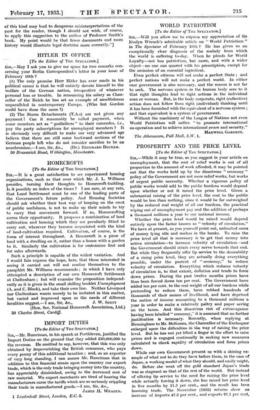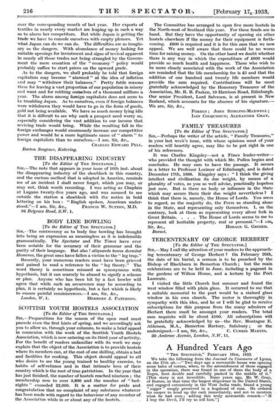PROSPERITY AND THE PRICE LEVEL
[To the Editor of TUE SPECTATOR.]
Sra.—While it may be true, as you suggest in your article on unemployment, that the cost of relief works is out of all proportion to the amount of work afforded, it may be pointed out that the works held up by the disastrous " economy " policy of the Government are not mere relief works, but works of urgent public necessity. Whether a vigorous policy of public works would add to the public burdens would depend upon whether or not it raised the price level. Given a substantial raising of the price level, the cost to the public would be less than nothing, since it would be far outweighed by the reduced real weight of all our burdens, the practical wiping out of unemployment pay and the addition of perhaps a thousand millions a year to our national income.
Whether the price level would be raised would depend entirely upon the factor known as "velocity of circulation." We have at present, as you yourself point out, unlimited sums of money lying idle and useless in the banks. To raise the price level all that is necessary is to get that money into active circulation—to increase velocity of circulation—and the Government should strain every nerve towards that end. But while they frequently offer lip service to the desirability of a rising price level, they are actually doing everything possible, under the pretext of "economy," to reduce velocity of circulation. Everything which reduces velocity of circulation is, to that extent, deflation and tends to force down prices. During the past twelve months prices have thus been forced down ten per cent. The Government have added ten per cent, to the real weight of all our burdens while pretending to reduce them, have robbed hundreds of thousands of their means of livelihood, and have deprived the nation of income amounting to a thousand millions a year in order to make a relatively paltry and paper saving on the taxes. And this disastrous riot of extravagance having been labelled "economy," it is assumed that no further justification is necessary. Recently, when replying at Birmingham to Mr. McKenna, the Chancellor of the Exchequer enlarged upon the difliculties in the way of raising the price level. But he has not yet lifted a linger in the effort to raise prices and is engaged continually in seeking new measures calculated to check rapidity of circulation and force prices down.
While our own Government present us with a shining ex- ample of what not to do they have before them, in the case of Japan, a working model of what they should, and easily might, do. Before she went off the gold standard Japan's trade was as stagnant as that of the rest of the world. But instead of offering lip service to the need for raising the price level while actually forcing it down, she has raised her price level In five months by 21.5 per cent., and the result has been booming trade. The November (1982) returns show an increase of imports 47.3 per cent., and exports 97.1 per cent,
over the corresponding month of last year. Her exports of textiles in nearly every market are leaping up in such a way as to alarm her competitors. But while Japan is getting the trade we have to console ourselves with empty phrases. Yet what Japan can do we can do. The difficulties are as imagin- ary as the dangers. With abundance of money looking for suitable openings for investment and signs of revival apparent in nearly all those trades not being strangled by the Govern- ment the mere cessation of the " economy " policy would probably suffice to start prices on the upward grade.
As to the dangers, we shall probably be told that foreign capitalists may become " alarmed " at the idea of inflation and may "withdraw their balances." Pretty futile reasons these for leaving a vast proportion of our population in misery and want and for robbing ourselves of a thousand millions a year. The alarm among foreign capitalists does not seem to be troubling Japan. As to ourselves, even if foreign balances were withdrawn they would have to go in the form of goods, gold not being available. We have so much money lying idle that it is difficult to see why such a prospect need worry us, especially considering the vast addition to our income that reviving trade would bring. While the resulting fall in the foreign exchanges would enormously increase our competitive power and would be a more legitimate cause of " alarm " to foreign capitalists than to ourselves.—I am, Sir, &c., Barton Seagrove, Kettering.
CHARLES EDWARD PELL.







































 Previous page
Previous page